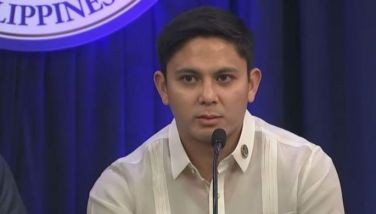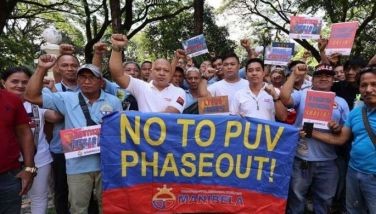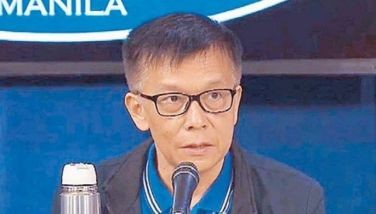Drug war ‘excellent’ but suspects should live – poll
MANILA, Philippines - Eight in 10 Filipinos approved of the way the Duterte administration was addressing the illegal drug problem in the country, but a high 94 percent of them also expressed belief the suspects should be caught alive, a latest survey by the Social Weather Stations (SWS) showed.
Malacañang expressed elation over the survey results and vowed to pursue the drug war to its logical conclusion amid concerns about extrajudicial killing of some drug suspects.
President Duterte, for his part, said he was happy to receive a passing grade of 75 in his first 100 days in office.
“The (SWS) survey gave me something like (76 percent satisfaction rating). I don’t need that. Actually, that’s how I am. If you really know me… dyan lang ako naglalaro – 75, 76 – basta ‘wag lang bumagsak,” Duterte said in a speech yesterday during the National Banana Congress in Lanang, Davao City.
The President said giving himself the lowest passing grade possible was not derogatory because that had always been the type of person he was. “For as long as I get more than five that’s OK because that is the breakeven grade,” Duterte said.
The survey – conducted from Sept. 24 to 27 – showed 84 percent of Filipinos were satisfied with the ongoing war against illegal drugs and only eight percent dissatisfied, yielding an “excellent” net satisfaction score of +76 percent.
The remaining eight percent of respondents were undecided.
Presidential Communications Office Secretary Martin Andanar said the figures validated Duterte’s “landslide victory in the May elections based on his campaign pledge to eliminate the drug menace.”
Satisfaction with the government’s illegal drug campaign was “excellent” across areas and socioeconomic classes, the SWS said.
It was highest in Mindanao, President Duterte’s home region, at +87 percent (90 percent satisfied, three percent dissatisfied).
It was followed by Metro Manila at +78 percent (87 percent satisfied, nine percent dissatisfied), the Visayas at +76 percent (85 percent satisfied, 10 percent dissatisfied, rounded off) and balance Luzon at +71 percent (80 percent satisfied, nine percent dissatisfied).
By socioeconomic class, the drive got +79 percent from class E (86 percent satisfied, eight percent dissatisfied, rounded off), +79 percent (84 percent satisfied, five percent dissatisfied) among ABC and +76 (84 percent satisfied, eight percent dissatisfied) in class D or the masses.
Meanwhile, the poll also found 71 percent of respondents who said it was “very important” and another 23 percent saying it was “somewhat important” that those suspected of being involved in drugs be caught alive.
It was highest in the Visayas at 82 percent, followed by Metro Manila’s 74 percent, balance Luzon’s 70 percent and Mindanao’s 62 percent.
By socioeconomic class, it was highest among classes E and D at 72 percent, followed by class ABC at 57 percent.
The same survey showed 83 percent of Filipinos were of the belief that the administration’s intensified war against illegal drugs “does not discriminate by class.”
Thirteen percent, on the other hand, thought it was centered on the poor while four percent said it was centered on the rich.
“In all areas and classes, the dominant opinion was that the government anti-illegal drugs campaign does not discriminate by class,” the SWS said.
It was highest in Mindanao at 89 percent, followed by balance Luzon at 82 percent, the Visayas at 81 percent and Metro Manila at 79 percent.
By socioeconomic class, it was highest among class ABC at 90 percent, followed by class E at 84 percent and class D at 82 percent.
No turning back
Andanar said the relentless campaign against illegal drugs would be carried to its logical conclusion, which was “to emancipate the nation from the scourge of illegal drugs by running after all those involved in the illegal drug trade with the full force of the law.”
Duterte’s government, he added, would put up more rehabilitation centers to accommodate those who surrendered to authorities and expressed willingness to undergo treatment for their addiction.
“We reiterate: the Duterte administration does not condone summary execution or extrajudicial killing of drug suspects. The Philippine National Police is investigating all cases of extrajudicial killings and will prosecute the perpetrators to the full extent of the law. Let no one doubt the firm resolve of the Duterte administration to put an end to the drug menace,” Andanar said.
Presidential spokesman Ernesto Abella said the survey “tells us that a majority of the people trust the actions of the President, that they value human life and perceive fairness in the carrying out of police duties.”
“It is encouraging that the people and the President share in the dream to have a comfortable life for all,” Abella said.
The survey used face-to-face interviews with 1,200 adults nationwide and has sampling error margins of plus or minus three percentage points for national percentages and plus or minus six percentage points each for Metro Manila, balance Luzon, the Visayas and Mindanao.
Results of the SWS poll were published in the newspaper BusinessWorld yesterday.
SWS classifies net satisfaction ratings of at least +70 as “excellent”; +50 to +69 as “very good”; +30 to +49, “good”; +10 to +29, “moderate”; +9 to -9, “neutral”; -10 to -29, “poor”; -30 to -49, “bad”; -50 to -69, “very bad” as well as -70 and below as “execrable.”
Based on Philippine National Police data, there were 1,390 suspects killed in anti-drug operations between July 1, the day after Duterte assumed office, and Oct. 6.
Lower supply and demand
PNP chief Director General Ronald dela Rosa reiterated the drug war was gaining traction as the supply of drugs was drying up.
He also said the skyrocketing of prices of shabu was expected to lower the level of drug addiction in the country. Recent reports showed that a gram of shabu could now cost as high as P25,000.
Dela Rosa said those in the lower bracket of society would now find it difficult to buy drugs.
But some critics claimed that the supply shortfall could also attract foreign drug syndicates to come in and take advantage of the situation.
Dela Rosa, however, said international drug rings were just trying to use the country as a transshipment point.
For instance, he said the 28 kilos of cocaine from Brazil that were recently intercepted at the Ninoy Aquino International Airport (NAIA) were not intended for the local market.
Sincere but…
Members of the religious sector also pondered whether the end could justify the means in the drug war.
While he does not support the execution of drug suspects, Batangas Archbishop Ramon Arguelles said government’s campaign had so far produced positive results. – With Evelyn Macairan, Jaime Laude
- Latest
- Trending






























